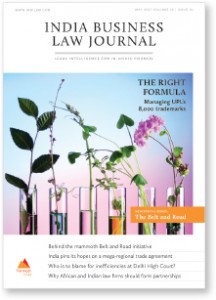A cheer for transparency, but for how long?
Owners of intellectual property (IP) rights in India have been cheering the publication of a new set of trademark rules. It reduces the paperwork when applying for a trademark and also finally provides trademark owners with a process to apply for well-known trademark status, which until now was a feat akin to a game of chance.
Yet questions triggered by the the Trade Marks Rules, 2017 – around the legitimacy of the new procedure for obtaining well-known mark status given that the Trade Marks Act does not sanction its creation – suggest that rights owners may not cheer for too long. It may also be typical of the “act now and figure it out later” ethos that characterizes the bureaucratic maze that can be India. Is this the best outcome after more than a year of deliberations on the new rules? If so, this is concerning for rights owners – many of whom will be in Barcelona to attend the 139th annual meeting of the International Trademark Association (INTA). India Business Law Journal will be there too, and this issue will be circulating widely among delegates.

As UPL’s general counsel Rohit Kumar tells us, the company has been working to set up a centralized system to manage its trademarks. The aim, as Kumar says, is to ensure “consistency for global products and global launches”. Finding an external party to help it in the process has been a challenge. “I don’t know of any other Indian company that will have this kind of a global footprint for their trademarks,” he says. The benefits of the exercise range from a recognition that the company should copyright its IP assets for more effective management to “more informed discussions and engagement between the legal and marketing teams”. Yet as Kumar says, it is a work in progress and one that gives him sleepless nights wondering what happens if the system fails.
Writing in this issue’s Vantage point Anil K Gupta, a grassroots innovations scholar, founder of the Honey Bee Network and professor at the Indian Institute of Management, Ahmedabad, says we need a global patent system that protects traditional knowledge and grassroots inventors, and ensures inclusive growth. Arguing that developing countries have enormous opportunities to create derivative innovations by using expired and abandoned patents, Gupta says we need a tick box system in the patent form for applicants to make their patents part of technology commons to encourage the improvement of poor livelihoods.
Trade between countries can also lead to improving livelihoods. In Eyeing Africa we turn the spotlight on growing trade relations between India and the African continent and ask how local law firms can profit. Collaboration between law firms in India and those in African countries is the need of the hour, given that much of the legal support for larger investments between India and Africa is provided primarily by large international law firms. What will it take for firms in India to develop connections in Africa in order to assist clients who have moved there?
Continuing on the same theme in Talking trade we focus on the aftermath of the US withdrawal from the Trans-Pacific Partnership and the proposal for a mega-regional trade agreement known as the Regional Comprehensive Economic Partnership (RCEP), which India may be a part of. The RCEP is expected to have profound geopolitical implications in addition to the potential that it offers for the promotion of trade liberalization in Asia.
But as we detail in Think big efforts such as the RCEP are dwarfed by China’s vision of its extensive Belt and Road Initiative. This ambitious strategy throws up a plethora of opportunities for everyone, but as Ronald Sum, a partner at Troutman Sanders, points out, it is the lawyers who are on the frontline. “The legal profession must lead the way to create a sound legal platform in all the OBOR countries,” says Sum.
This issue’s Intelligence report provides a data-driven analysis of what causes delays in Indian courts. A shortage of judges is usually cited as the main problem, but data from Delhi High Court reveal that delays caused by granting of excessive adjournments and absences by counsel were much more frequent and often overlooked. Unless both are tackled, the delays in court will persist, even with a sufficient number of judges in place.
Meaningful change will require more such data-driven initiatives.


























